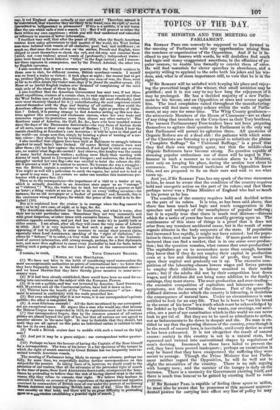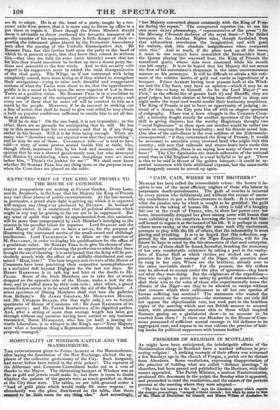TOPICS OF THE DAY.
THE MINISTER AND THE MEETING OF
PARLIAMENT.
SIR ROBERT PEEL Mt scarcely be supposed to look forward to the meeting of Parliament with any apprehension arising 'from
the numbers or organization of the Opposition. And if he is in- clined to pay his hearers with words, he will doubtless find much bad logic and many exaggerated assertions, in the effusions of po-
pular orators, to enable him formally to convict them of • error. He will find materials for clever speeches in abundance, and a majority willing to applaud to the echo both his jokes and his wis- dom, and, what is of more impottance still, to vote that he is in the right. If Sir ROBERT will be satisfied with keeping his place and enjoy- ing the proverbial laugh of the winner, that small ambition may be gratified ; and it is not easy to say- how long the enjoyment of it may be prolonged. He has a decided majority of a new Parlia- ment in his favour, and an Opposition at sixes and sevena against him. The loud complaints raised throughout the manufacturing- districts will find mere empty echoes within the walls of Parlia- ment, -at any rate for some time. The Whig County gentlemen— the aristocratic Members of the House of Commons—are as chary of any thing that trenches on the Corn-laws as their Tory brethren. The earnest Parliamentary Free-traders have not been preparing themselves to -agitate their question in Parliament in the only way that Parliament will permit its agitation there. All questions of Organic Reform are at a dead ebb : the patience with which some of the Chartists are listening to a proposal to substitute the phrase " Complete Suffrage" for " Universal Suffrage," is a proof that they feel their own strength spent, not that the middle-class Organic Reformers have become strong. No question capable of arousing popular enthusiasm out of doors will be urged in Par- liament in such a manner as to occasion alarm to a Minister, bent only on keeping his place, during the session now skint to commence. The experienced tacticians of the Opposition know this, and are prepared to lie on their oars and wait to ace what turns up. And yet, if Sir ROBERT PEEL has any spark of the true statesman in him, he must be aware that the condition of the country requires bold and energetic action on the part of its rulers ;`and that there perhaps never was a Prime Minister of England who had so•much in his power as he has. The condition of the country requires bold and decided action on the part of its rulers. It is true, as has been said above, that there has been much bad logic and much exaggeration in the speeches and writings of the mouthpieces of popular suffering; but it is equally true that there is much real distress—distress which for a series of years has been steadily growing upon us. The continuance of this state of things is a proof that it does not arise from any transient accidental cause, but is the result of some organic ailment in the body corporate of the state. If population had intreased less rapidly, it might not have existed: but thepopu- lation is there, and must be provided for. If more goods are manu- factured than can find a market, that is in one sense over-produc- tion; but the question remains, what causes that over-production? The capitalists go on to accumulate more than enough, because they know that if they do not employ their capital in production even at a low and diminishing rate of profit, they mtist live upon their capital and gradually eat it up. The excessive com- petition oflhe labouring-classes lowers wages and forces parents to employ their children in labour unsuited to their tender years ; but if the adults did not by their competition beat down wages, and if children did not bring some addition to the family's earnings, they must starve. The over-production and over-trading- the excessive competition of capitalists and labourers—are the symptoms, not the causes of the disease. Part of the generally- diffused distress under which the country is labouring, is doubtless the consequence of natural laws. Under no circumstances is min entitled to look for an easy life. That be is born to "eat his bread in the sweat of his brow" is a truth which must be acknowledged by the Infidel as by the Christian. Our wants, our cravings, our anxi- eties, are a part of our constitution which in this world we can never look to get rid of. But they are to be used as stimulants to aCtion, not as inducements to lie down in despair and die. No man is en- titled to say that the growing distress of the country, even though it be the result of natural laws, is inevitable, until every device to avert it has been exhausted. It is not altogether the result of natural mattes : society in this country is not in a natural state, but squeezed and twisted into conventional shapes by regulations of men's devising. Insomuch as these have failed to prevent the evil, they have been proved inadequate ; perhaps on examination it may be found that they have exasperated the suffering they were meant to assuage. Though the Prime Minister fear not Parlia- ment neither regard the Opposition, he will do well not to slight the necessities of the country. There is no safe arguing with hungry men ; and the number of the hungry is daily on the increase. There is a necessity for Government exerting itself, and there is much true honour to be gained by exerting itself to some purpose. If Sir ROBERT PEEL is Capable of feeling these spurs to 'action, he must also be aware that he possesses at this moment unprece- dented powers for carrying into effect any line of policy be may see fit to adopt„ He is at the head of a party, taught by a ten- years' exile from power, that it is more easy to throw up office in a pet them to regain it. Even though the Prime Minister should deem it advisable to throw overboard the favourite measures of a goodly number of his supporters, there is little danger of their re- peating the infatuated game played by the Protestant Ascendancy men after the passing of the Catholic Emancipation Act. Sir ROBERT PEEL has this further hold upon the party at the head of which he at present stands, that they know they cannot do without him—that they are fully (in some cases bitterly) aware that but for him they would tomorrow be broken up into a dozen petty fac- tions and scattered to the four winds. And to this security with regard to his supporters must be added the total disorganization of the rival party. The Whigs, as if not contented with being completely routed, have been acting as if they wished to strengthen their antagonists—trying to raise such dreadful and exaggerated notions of what the Tories were about to do, that the apprehensive public is in a mood to look upon the mere negation of bad in these Tories as a positive virtue. Sir ROBERT PEEL is in a condition to set at naught many of the antiquated prejudices of his party; and every one of' them that he casts off will be counted to him as a merit by the people. Moreover, if he do succeed in striking out a line of action that shall be found to give real relief, he may obtain a hold on popular confidence sufficient to enable him to set all fac- tions at defiance.
Will he do this ? On the one hand, it is not impossible ; on the other, there are no grounds for anticipating that he will. He has up to this moment kept his own secret ; and that is, if any thing, rather in his favour. Still it is far from being enough. There are many who "therefore only are reputed wise that they say nothing" ; and he may be one of those. COLERIDGE tells—or is said to have told—a story of some person seated beside him at table, who, though silent, impressed him, by his look and manner, with the opinion that he was a shrewd gentlemanly man, but who destroyed that illusion by exclaiming, when Some dumplings were set down before him, " Them's the jockies for me !" We shall soon know whether Sir ROBERT PEEL has any thing more to the purpose to say when the Corn-laws are placed on the table.



























 Previous page
Previous page